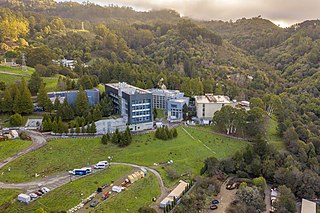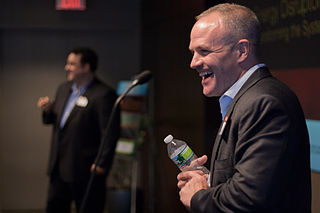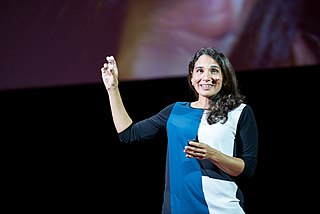Related Research Articles

Lawrence Berkeley National Laboratory (LBNL) is a federally funded research and development center in the hills of Berkeley, California, United States. Established in 1931 by the University of California (UC), the laboratory is sponsored by the United States Department of Energy and administered by the UC system. Ernest Lawrence, who won the Nobel prize for inventing the cyclotron, founded the Lab and served as its Director until his death in 1958. Located in the Berkeley Hills, the lab overlooks the campus of the University of California, Berkeley.

Dudley Robert Herschbach is an American chemist at Harvard University. He won the 1986 Nobel Prize in Chemistry jointly with Yuan T. Lee and John C. Polanyi "for their contributions concerning the dynamics of chemical elementary processes". Herschbach and Lee specifically worked with molecular beams, performing crossed molecular beam experiments that enabled a detailed molecular-level understanding of many elementary reaction processes. Herschbach is a member of the Board of Sponsors of the Bulletin of the Atomic Scientists.

The UC Berkeley College of Chemistry is one of the fifteen schools and colleges at the University of California, Berkeley. It houses the department of chemistry and the department of chemical and biomolecular engineering.
The University of California, Berkeley College of Engineering is the engineering school of the University of California, Berkeley. Established in 1931, The college occupies fourteen buildings on the northeast side of the main campus and also operates the 150-acre (61-hectare) Richmond Field Station.

Armand Paul Alivisatos is an American chemist and academic administrator who has served as the 14th president of the University of Chicago since September 2021. He is a pioneer in nanomaterials development and an authority on the fabrication of nanocrystals and their use in biomedical and renewable energy applications. He was ranked fifth among the world's top 100 chemists for the period 2000–2010 in the list released by Thomson Reuters.

Jay D. Keasling is a professor of chemical engineering and bioengineering at the University of California, Berkeley. He is also associate laboratory director for biosciences at the Lawrence Berkeley National Laboratory and chief executive officer of the Joint BioEnergy Institute. He is considered one of the foremost authorities in synthetic biology, especially in the field of metabolic engineering.

The President's Council of Advisors on Science and Technology (PCAST) is a council, chartered in each administration with a broad mandate to advise the president of the United States on science and technology. The current PCAST was established by Executive Order 13226 on September 30, 2001, by George W. Bush, was re-chartered by Barack Obama's April 21, 2010, Executive Order 13539, by Donald Trump's October 22, 2019, Executive Order 13895, and by Joe Biden's February 1, 2021, Executive Order 14007.

Carolyn Ruth Bertozzi is an American chemist and Nobel laureate, known for her wide-ranging work spanning both chemistry and biology. She coined the term "bioorthogonal chemistry" for chemical reactions compatible with living systems. Her recent efforts include synthesis of chemical tools to study cell surface sugars called glycans and how they affect diseases such as cancer, inflammation, and viral infections like COVID-19. At Stanford University, she holds the Anne T. and Robert M. Bass Professorship in the School of Humanities and Sciences. Bertozzi is also an Investigator at the Howard Hughes Medical Institute (HHMI) and is the former director of the Molecular Foundry, a nanoscience research center at Lawrence Berkeley National Laboratory.

The California Institute for Quantitative Biosciences (QB3) is a nonprofit research and technology commercialization institute affiliated with three University of California campuses in the San Francisco Bay Area: Berkeley, San Francisco, and Santa Cruz. QB3's domain is the quantitative biosciences: areas of biology in which advances are chiefly made by scientists applying techniques from physics, chemistry, engineering, and computer science.

Frances Hamilton Arnold is an American chemical engineer and Nobel Laureate. She is the Linus Pauling Professor of Chemical Engineering, Bioengineering and Biochemistry at the California Institute of Technology (Caltech). In 2018, she was awarded the Nobel Prize in Chemistry for pioneering the use of directed evolution to engineer enzymes.
Lloyd Noel Ferguson was an American chemist.
Alanna Schepartz is an American professor and scientist. She is currently the T.Z. and Irmgard Chu Distinguished Chair in Chemistry at University of California, Berkeley. She was formerly the Sterling Professor of Chemistry at Yale University.

Judith P. Klinman is an American chemist, biochemist, and molecular biologist known for her work on enzyme catalysis. She became the first female professor in the physical sciences at the University of California, Berkeley in 1978, where she is now Professor of the Graduate School and Chancellor's Professor. In 2012, she was awarded the National Medal of Science by President Barack Obama. She is a member of the National Academy of Sciences, American Academy of Arts and Sciences, American Association for the Advancement of Science, and the American Philosophical Society.
John Michael Prausnitz is an emeritus professor of chemical engineering at the University of California, Berkeley.

Emily A. Carter is the Gerhard R. Andlinger Professor in Energy and the Environment and a professor of Mechanical and Aerospace Engineering (MAE), the Andlinger Center for Energy and the Environment (ACEE), and Applied and Computational Mathematics at Princeton University. She is also a member of the executive management team at the Princeton Plasma Physics Laboratory (PPPL), serving as Senior Strategic Advisor and Associate Laboratory Director for Applied Materials and Sustainability Sciences.

Matthew V. Tirrell is an American chemical engineer. In 2011 he became the founding Pritzker Director and dean of the Institute for Molecular Engineering (IME) at the University of Chicago, in addition to serving as senior scientist at Argonne National Laboratory. Tirrell's research specializes in the manipulation and measurement of polymer surface properties, polyelectrolyte complexation, and biomedical nanoparticles.

Rebecca Abergel is a professor of nuclear engineering and of chemistry at University of California, Berkeley. Abergel is also a senior faculty scientist in the chemical sciences division of Lawrence Berkeley National Laboratory, where she directs the Glenn T. Seaborg Center and leads the Heavy Element Chemistry research group. She is the recipient of several awards for her research in nuclear and inorganic chemistry.
Teresa Lyn Head-Gordon is an American chemist and the Chancellor's Professor of Chemistry, Bioengineering, and Chemical and Biomolecular Engineering at the University of California, Berkeley. She is also a faculty scientist in the Chemical Sciences Division at the Lawrence Berkeley National Laboratory and a fellow of both the American Institute for Medical and Biological Engineering and the American Chemical Society (ACS).
C. Judson King is an American chemical engineer, researcher, administrator and educator. He is professor emeritus at University of California, Berkeley, and UC universitywide provost and senior vice president of academic affairs, emeritus, at University of California. He is the former director of Center for Studies in Higher Education and the former dean of College of Chemistry at UC Berkeley.
References
- 1 2 3 "Douglas S. Clark". Cornell University Smith School of Chemical and Biomolecular Engineering. Retrieved 9 October 2023.
- 1 2 "Douglas Clark". University of California, Berkeley Research. Retrieved 9 October 2023.
- 1 2 "Douglas S. Clark". University of California, Berkeley College of Chemistry. Retrieved 9 October 2023.
- 1 2 "Douglas Clark, Ravi Kane Receive Awards from AIChE's Society for Biological Engineering". American Institute of Chemical Engineers. 13 October 2014. Retrieved 9 October 2023.
- ↑ "Douglas Clark tapped to be next College of Chemistry Dean". Lawrence Berkeley National Laboratory. 9 May 2013. Retrieved 9 October 2023.
- ↑ "Douglas S. Clark". Lawrence Berkeley National Laboratory. Retrieved 9 October 2023.
- ↑ "DOUGLAS CLARK, PH.D." American Institute of Medical and Biological Engineering. Retrieved 9 October 2023.
- ↑ Sirica, Coimbra (31 October 2003). "AAAS members elected as fellows". Science. 302 (5646).
- ↑ "Professor Douglas S. Clark". United States National Academy of Engineering. Retrieved 9 October 2023.